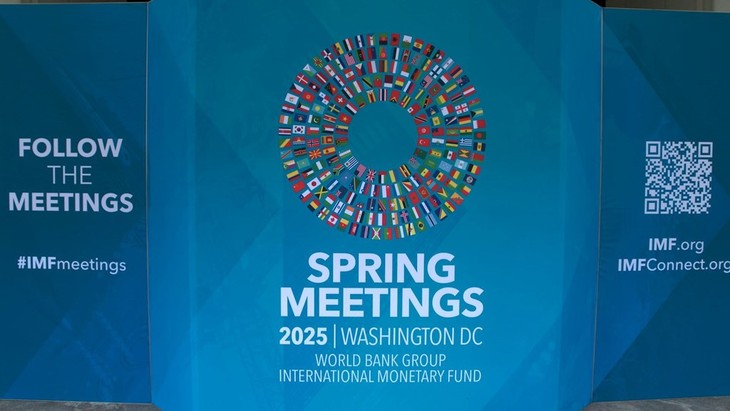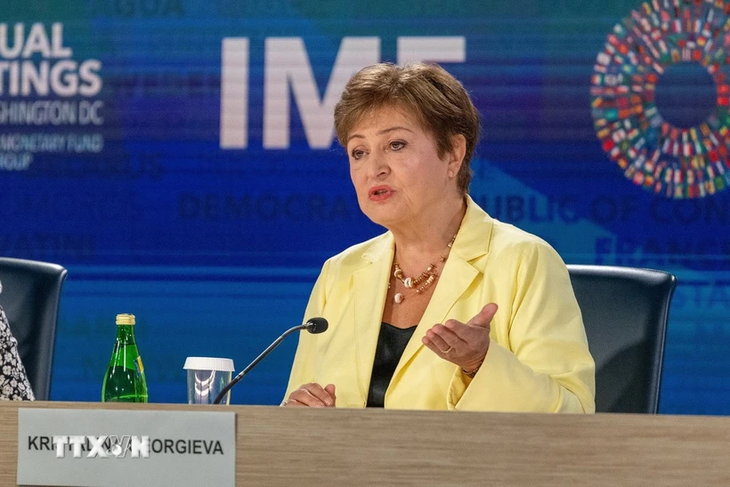(VOVWORLD) - The Spring Meetings of global financial leaders, organized by the International Monetary Fundand the World Bank, are taking place this week in Washington, D.C. With global uncertainties growing, the meetings will try to clarify global growth outlook.
 Tariff issues dominate the IMF-WB Spring Meetings. (photo: IMF) Tariff issues dominate the IMF-WB Spring Meetings. (photo: IMF) |
The Spring Meetings, one of the two largest annual meetings held by the IMF and WB, discuss the global economy, governance policies, and solutions to post-conflict recovery in several countries.
Question of recession
With global trade facing strong headwinds due to new US tariff policies, the Spring Meetings are under pressure to answer a crucial question: Is the world economy heading into a recession this year, as many have pessimistically forecast?
IMF Managing Director Kristalina Georgieva told a a press conference on April 17 that, despite President Donald Trump's tariff policies, a recession can still be avoided.
“What we see is the real economy is functioning. Labor markets are still quite strong -- very important -- and we have to reflect on that the financial system is holding despite all the nervousness. Why? Because, after the global financial crisis, a lot has been done to build strength, exactly for moments like this,” said Georgieva.
In its World Economic Outlook released late last year, the IMF projected global economic growth of 3.3% both this year and next, with global inflation expected to average 4.2% this year and 3.5% next year. IMF Chief Economist Pierre-Olivier Gourinchas blog posted last week that global trade tensions could increase inflation in the short-term, potentially bringing growth down below previous forecasts, but would not lead to a recession.
IMF leaders and experts say that, while the global economy has shown resilience, there is an urgent need to end investor anxiety. IMF chief Georgieva said fears of a recession are largely psychological. “One thing I learned through crisis periods is perceptions matter as much as reality. If perceptions change negatively that can be quite detrimental to the performance of the economy," she said.
Georgieva called on countries to “recalibrate” by gradually adjusting fiscal policy to reduce debt levels while maintaining flexible and credible monetary policy. She also urged governments to address internal and external macroeconomic imbalances.
 IMF Managing Director Kristalina Georgieva (photo: XNA/VNA) IMF Managing Director Kristalina Georgieva (photo: XNA/VNA) |
Funding and reconstruction
To keep the Spring Meetings from being dominated by the current tariff issues, the agenda includes financing programs, foreign investment flows, debt relief for poorer economies, climate change policy, and support for conflict-affected nations.
One notable topic is restoring IMF and WB financial support for Syria, a country undergoing significant political changes following the collapse of President Bashar Al-Assad’s regime late last year. In recent months, Syria’s new administration has introduced more open domestic and foreign policies, paving the way for its reintegration into the global economy.
Abdallah Al Dardari, the UN Assistant Secretary General, said a roundtable discussion on funding Syria’s reconstruction will take place during the Spring Meetings. The goal is to mobilize resources from the IMF, WB, multilateral institutions, and donor countries. UNDP plans to provide Syria with 1.3 billion USD over the next three years, while Saudi Arabia has settled Syria's 15 million USD debt to the World Bank. These moves are expected to ease Syria’s access to international financial resources.
“A roundtable on Syria hosted by the Saudi government and the WB would take place on the sidelines of the annual meetings of the international financial bodies in Washington. It gives a signal to the rest of the world and to the people of Syria that you have these biggest financial institutions ready to support,” said Dardari.
Argentina’s issues are to draw attention as well. Earlier this month, Argentina secured a 20 billion USD loan from the IMF to restructure its debts and strengthen the capacity of its central bank. However, the deal requires Argentina to ease foreign exchange control and allow the peso to float more freely against the US dollar.
Some traditional topics of the IMF-WB meetings, such as promoting green finance for developing nations and restructuring debt for low-income countries, may take a back seat at this year’s event.